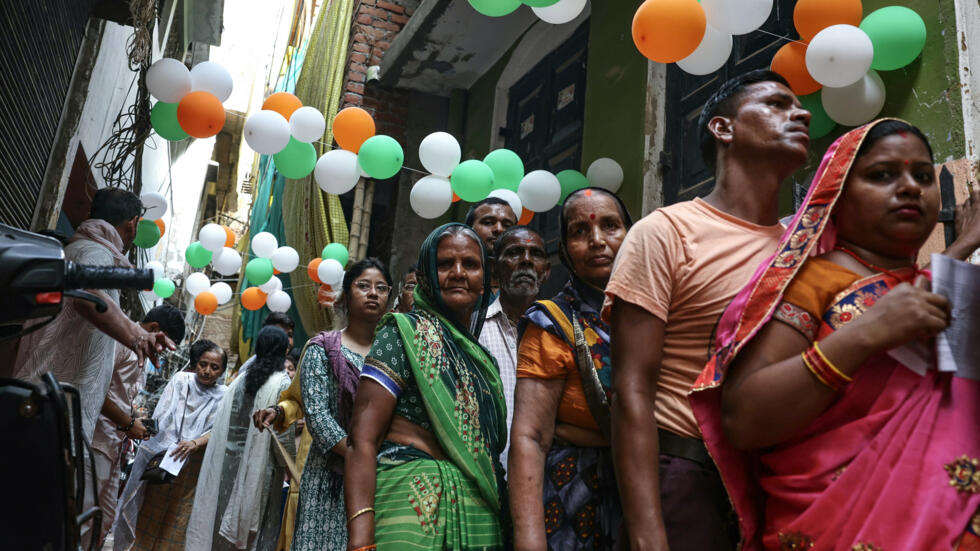
VARANASI, India, June 1, 2024 (BSS/AFP) - India's gruelling heatwave is set to abate soon but that was no consolation to housewife Bindwasvini Devi, one of the millions braving Saturday's scorching sun to vote in the final day of national elections.
Crowds lined up early outside polling booths to beat the heat in the Hindu holy city of Varanasi, where a week of unbearable temperatures has brought daily life to a standstill.
With temperatures peaking at 44 degrees Celsius (111 degrees Fahrenheit) in the afternoon, many were keen to dispense with their democratic duty as soon as possible and return home to bunker down until the heat recedes.
"It made a lot more sense to be out before the sun gets stronger," Devi, 42, told AFP from outside a booth in her neighbourhood soon after polls opened, admitting even at that early hour that the heat was taking a toll.
"The last few days have been very tough and we've tried to stay hydrated and avoided going out as much as possible."
Even in the morning hours, polling officials and voters alike had faces coated in a sheen of sweat.
Many queueing up grumbled among themselves over long wait times outdoors and in corridors without overhead fans or air conditioning.
The ancient city of Varanasi is the spiritual capital of the Hindu faith, where Indians bring their deceased loved ones for funeral rites at crematoriums lining the banks of the Ganges river.
Most of the year, it is a thriving religious centre that hosts pilgrims visiting temples, religious processions through ancient alleyways, and a regular stream of Western tourists in search of enlightenment.
But by midday, streets and polling stations were all but deserted as the city's two-million-odd residents retreated from yet another day of blazing heat.
- Dozens of deaths -
India is no stranger to searing summer temperatures but years of scientific research have found climate change is causing heatwaves to become longer, more frequent and more intense.
Heatstroke has killed dozens of people across northern India this week, according to state government figures and local media reports, with peak temperatures in several cities well above 45 degrees Celsius.
That included 10 election workers in the eastern state of Bihar, who died in a single day on Thursday while setting up polling booths.
Abnormally high temperatures have been a constant burden for both poll workers and the public through the election, which was staggered across six weeks to ease the logistical burden of servicing India's 968 million eligible voters.
Turnout has dropped several percentage points since the last national poll with analysts saying that hotter-than-average temperatures were partly to blame, along with widespread expectations Prime Minister Narendra Modi will win a third term.
In the city of Mathura, a three-hour drive from New Delhi, election commission figures showed turnout dropping nearly nine points to 52 percent from five years earlier after hot weather.
The heat has also disrupted campaigning.
Roads minister Nitin Gadkari fainted while addressing a rally for Modi's party in April and was carried off the stage by handlers, afterwards blaming the incident on discomfort "due to the heat".
- 'This is our duty' -
India's election commission again said Friday it had directed polling stations to "take adequate measures to manage the adverse impact of hot weather" on voters.
It also defended itself against suggestions it had failed to take into account the impact of the heatwave on voting.
"In spite of hot weather conditions, voters have turned up in huge numbers at the polling stations," a commission statement said.
Little by way of relief was on display at one polling station in Varanasi, where poll workers had erected white canvas sheets to shield queues from the sun and put out communal plastic water jugs for voters in need of rehydration.
Polling booth official Kshem Kumar Pathak, 43, told AFP he had to turn away one group of women who queued up at the crack of dawn, hoping to cast their votes before the sun rose.
"We obviously explained the rules to them and asked them to come back later," he said.
"Everyone wants to avoid the queues in this heat and hopes to get back home as early as possible."
Pathak was sanguine about the impact of the heat on himself and his colleagues.
"There isn't much we can do about the temperature," said the 43-year-old.
"It's obviously tough, but this is our duty."